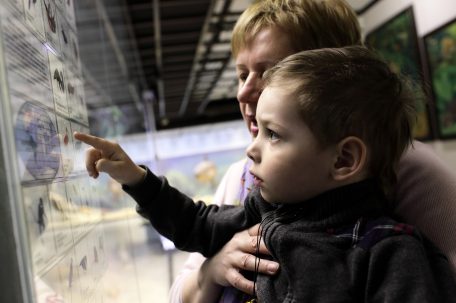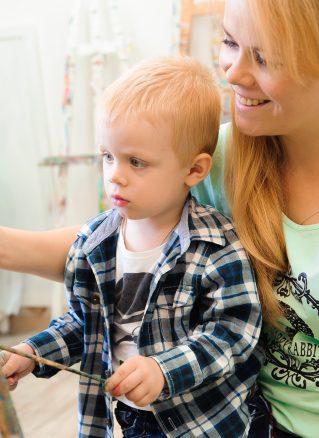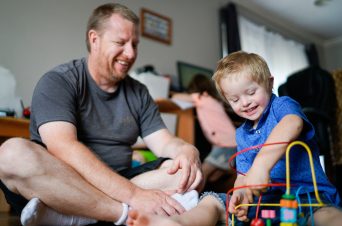Transforming outcomes for children and young people in care
Innovations in children's social care
With Spring consortium delivering for the department for education, UK
The care system can be transformative, giving young people and their families the support they need at the most difficult points in their lives. But too many young people have a poor experience of the system and poor long-term outcomes, leaving care without the skills, relationships or emotional stability to ready them for adulthood. There are examples of great practice across the sector. But the scale of these challenges requires an approach that goes further than incremental improvement or isolated examples of progress. The Children’s Social Care Innovation Programme is a strategic intervention intended to introduce a step change in the way children’s social care is designed, delivered, evaluated and paid for across the system.
The problem
70,440 young people
in England were in care in 2016, the highest number for 22 years, with another 450,000 on a child protection plan or designated as children in need
£7 billion
is spent annually by local authorities in England on services for children at risk, in need and in care - an average of £46m per council
30,000 young people
in England leave care at 18 every year at high risk of homelessness, imprisonment, mental ill-health and unemployment
The demand on the children’s social care system has been rising steadily. In total, a little under half a million children and young people in England alone receive support from social care services each year. In an age of diminishing local authority budgets, costs in children’s social care are increasing every year. And across a wide range of indicators, including education, employment, mental health, criminal behaviour and homelessness, children who are in or have left care have significantly worse outcomes than average.
In 2014 the Department for Education (DfE) announced a two year, £100m innovation fund to support 53 bold new approaches to transform outcomes for children and young people in care. The success of the programme led to a second phase beginning in 2016, with £200m committed over four years. The DfE commissioned Spring Consortium to be the delivery partner for the programme. Innovation Unit is proud to be a member of Spring Consortium alongside our partners Deloitte and Mutual Ventures. Spring Consortium works with project teams and with the Department for Education through every stage of the Innovation Programme, including designing and running the application process; providing project-specific coaching on innovation, implementation and leadership; and facilitating learning across the Programme to understand how innovation can embed, flourish and scale across the sector.
The choice in children’s social care is not one of improvement or innovation: both are essential. Achieving the scale of transformation needed to give all children the life chances they deserve cannot be achieved through steady improvement or step-change innovation alone. What’s required is a balance between improving services for young people in the system now and enabling the radical shifts that will achieve dramatically different, better outcomes in the future. New approaches need to be tried at every level, in big and small ways: practice innovation that rethinks what happens at the interface between practitioners and families; service innovation that rethinks provision and pathways; and system innovation that rethinks how organisations in a system operate as a whole.
“I love the Innovation Programme and the spirit it has generated.” Isabelle Trowler
Impact
70 projects
covering 90 local authorities supported in the first two years of the Programme, with more joining throughout 2017
£155m
funding awarded to projects so far
The projects in the programme cover a huge range of topics, from child sexual exploitation to new models of foster care; from adoption support to social work training; from rethinking residential care to new funding and commissioning models. All are rooted in a clear vision and principles that set a shared purpose for the work. These include high aspirations for every child that are long-term and set ambition as high as possible; putting people and relationships first, ahead of structures, systems or processes; and working and learning together in open and honest ways.
North Yorkshire’s No Wrong Door model provides flexible residential support for complex adolescents, creating bespoke placements to support stability at home or in foster care under the principle of ‘no move until it’s the right move’.
“It provides that essential consistency: a trusting relationship that sticks with them no matter how they move through care.” Pete Dwyer
Islington Council is embedding Motivational Social Work to ensure social workers are focused on supporting change, and using values-based tools to measure what matters to children and families.
The Fostering Network has brought the Mockingbird model, developed in the US, to the UK system. The model clusters trained foster and kinship carers in ‘constellations’ around a hub carer who provides respite, supervision, training and shared activities.
Child House is a child-centred response to sexual abuse. Developed in 1998 in Iceland as Barnahus, in 2017 it will be piloted in London by the Mayor’s Office for Policing and Crime. The model will bring the NHS, social care, police, criminal justice and third sector services together under one roof.
Achieving for Children is a social enterprise created by the London boroughs of Kingston upon Thames and Richmond upon Thames. Jointly by the two LAs, Achieving for Children has the autonomy to design, commission and develop new services for children across the boroughs.
Leeds’ Family Valued programme is embedding restorative practice as the ethos of children’s services, while developing Family Group Conferencing as a core offer to families in circumstances including domestic violence. Over 5,000 practitioners across the children’s workforce and beyond have been trained in restorative practice.
“Building stronger families, however those families are defined, is at the very heart of our ambition to be the best city for children and young people to grow up in.” Nigel Richardson
Evaluations from the 57 projects which formed the first round of the Innovation Programme (2013-2015) are being published on the Spring Consortium website on a rolling basis through spring and summer 2017.
For more information see www.springconsortium.com
Project team
Matthew Horne
Deputy Chief Executive
Cath Dillon
Director of Innovation





